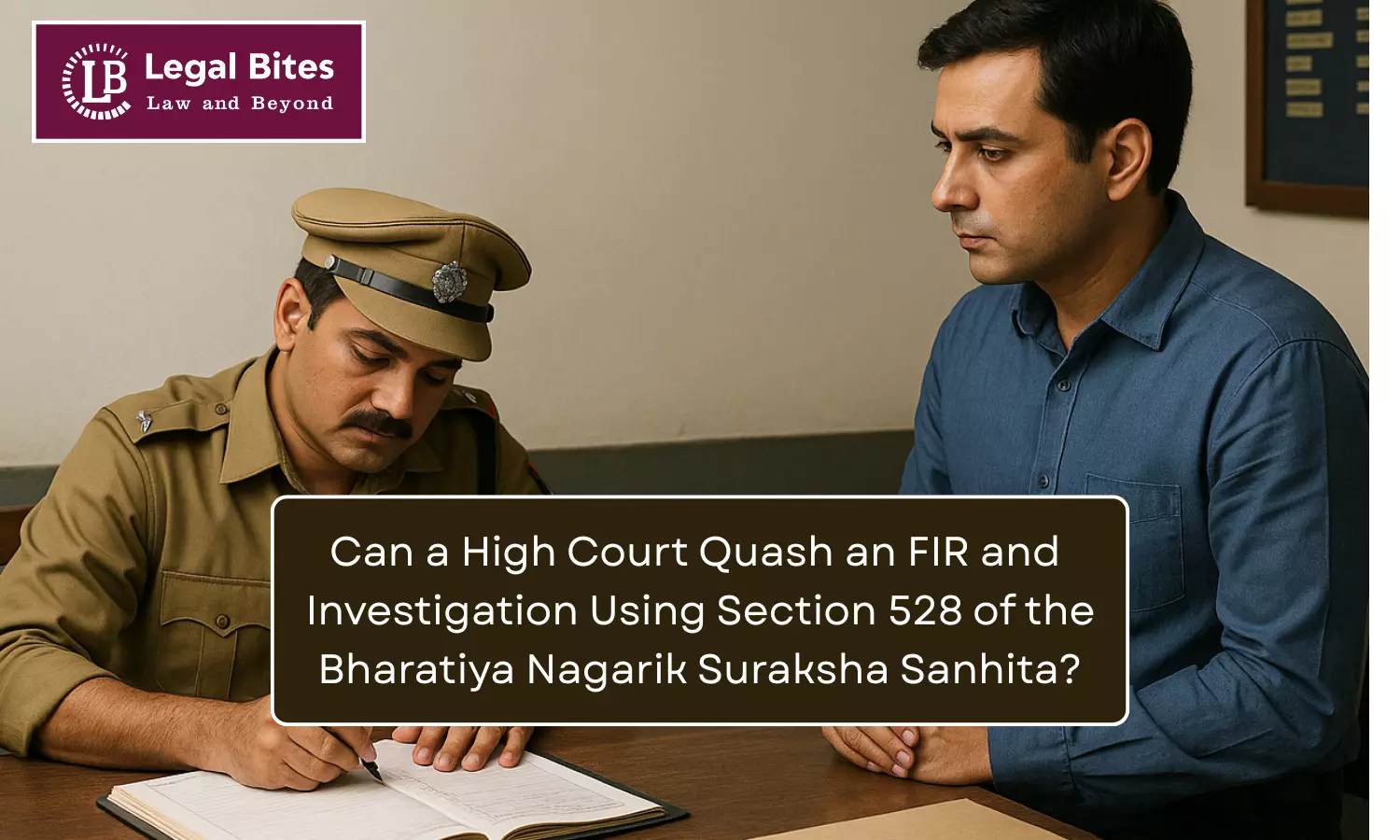Can a High Court Quash an FIR and Investigation Using Section 528 of the Bharatiya Nagarik Suraksha Sanhita?
High Courts can quash FIRs under Section 528 BNSS to prevent injustice, misuse of criminal law, and protect fundamental rights—it's a vital legal safeguard.

The Bharatiya Nagarik Suraksha Sanhita (BNSS), 2023, introduced significant procedural reforms in India's criminal justice system. One provision that closely mirrors its predecessor, Section 482 of the Code of Criminal Procedure (CrPC), is Section 528 BNSS, which preserves the inherent powers of the High Court. A recurring judicial question arises—can FIRs and consequent investigations be quashed under Section 528 BNSS?In Shashank Gupta Alias Guddu & Ors. v. State of U.P. &...
The Bharatiya Nagarik Suraksha Sanhita (BNSS), 2023, introduced significant procedural reforms in India's criminal justice system. One provision that closely mirrors its predecessor, Section 482 of the Code of Criminal Procedure (CrPC), is Section 528 BNSS, which preserves the inherent powers of the High Court. A recurring judicial question arises—can FIRs and consequent investigations be quashed under Section 528 BNSS?
In Shashank Gupta Alias Guddu & Ors. v. State of U.P. & Anr., Application U/S 528 BNSS No. 10997 of 2025, the Allahabad High Court tackled this vital issue. The Court's analysis offers clarity on the maintainability of such petitions, the legacy of earlier case law, and the modern judicial stance following landmark Supreme Court precedents.
Section 528 of the Bharatiya Nagarik Suraksha Sanhita (BNSS), 2023: Scope
Section 528 BNSS, mirroring Section 482 CrPC, reads:
“Nothing in this Sanhita shall be deemed to limit or affect the inherent powers of the High Court to make such orders as may be necessary—(i) to give effect to any order under this Sanhita; or (ii) to prevent abuse of the process of any Court; or (iii) otherwise to secure the ends of justice.”
Thus, three grounds emerge for invoking inherent powers:
- Giving effect to an order under BNSS;
- Preventing abuse of process of court;
- Securing the ends of justice.
The Legal Dispute: Whether FIRs Can Be Quashed U/S 528 BNSS
The matter before the Allahabad High Court involved a challenge to the registration of an FIR based on a magistrate’s direction under Section 175(3) BNSS (formerly Section 156(3) CrPC). The applicants, charged under Sections 498A, 323, 504, 506, 342 IPC and Sections 3/4 of the Dowry Prohibition Act, sought quashing of the FIR through Section 528 BNSS.
The preliminary objection from the State cited the Full Bench decision in Ramlal Yadav v. State of U.P. (1989), which held that FIRs and investigations cannot be quashed using inherent powers and must be challenged under Article 226 of the Constitution.
Conflicting Judicial Approaches: Article 226 v. Section 528 BNSS
The Old Position – Ramlal Yadav (1989) and Others v. State of U.P. & Others
The Full Bench in Ramlal Yadav held:
- The High Court cannot quash investigations under Section 482 CrPC.
- FIRs can only be challenged under Article 226, relying heavily on Khawaja Nazir Ahmad (1944 PC) and other precedents.
The Modern View – Supreme Court Clarifications
The 2025 ruling in Shashank Gupta highlighted that Ramlal Yadav is no longer good law. Relying on Supreme Court decisions in:
- State of Haryana v. Bhajan Lal (1992 Supp (1) SCC 335)
- Swapan Kumar Guha v. State of West Bengal (1982) 1 SCC 561
- Imran Pratapgadhi v. State of Gujarat (Criminal Appeal No.1545 of 2025)
- Abhishek v. State of Madhya Pradesh (2023) 16 SCC 666
- Mahmood Ali v. State of U.P. (2023) 15 SCC 488
The Court reiterated that:
Inherent powers are wide enough to quash FIRs and investigations where no prima facie cognizable offence is made out.
High Courts are not restricted to Article 226 for this relief.
Conclusion
The Allahabad High Court’s decision in Shashank Gupta represents a critical reaffirmation of the inherent powers of High Courts under Section 528 BNSS. Departing from the rigid stance of Ramlal Yadav, the court has harmonised statutory powers with evolving constitutional jurisprudence. The verdict underscores the judiciary’s commitment to safeguarding individual liberty and ensuring justice is not sacrificed at the altar of procedural formality.
In sum, yes—a High Court can quash an FIR and investigation using Section 528 of BNSS, provided the facts justify such intervention under established legal principles.

Arjun Mehta
Arjun Mehta is a legal scholar and author specializing in Criminal Law. A graduate of Banaras Hindu University (BHU), he brings academic rigor and practical insights to his writing. Through his works, Mehta illuminates the complexities of criminal jurisprudence, making legal concepts accessible to both practitioners and general readers. His contributions have established him as a respected voice in criminal law discourse.
